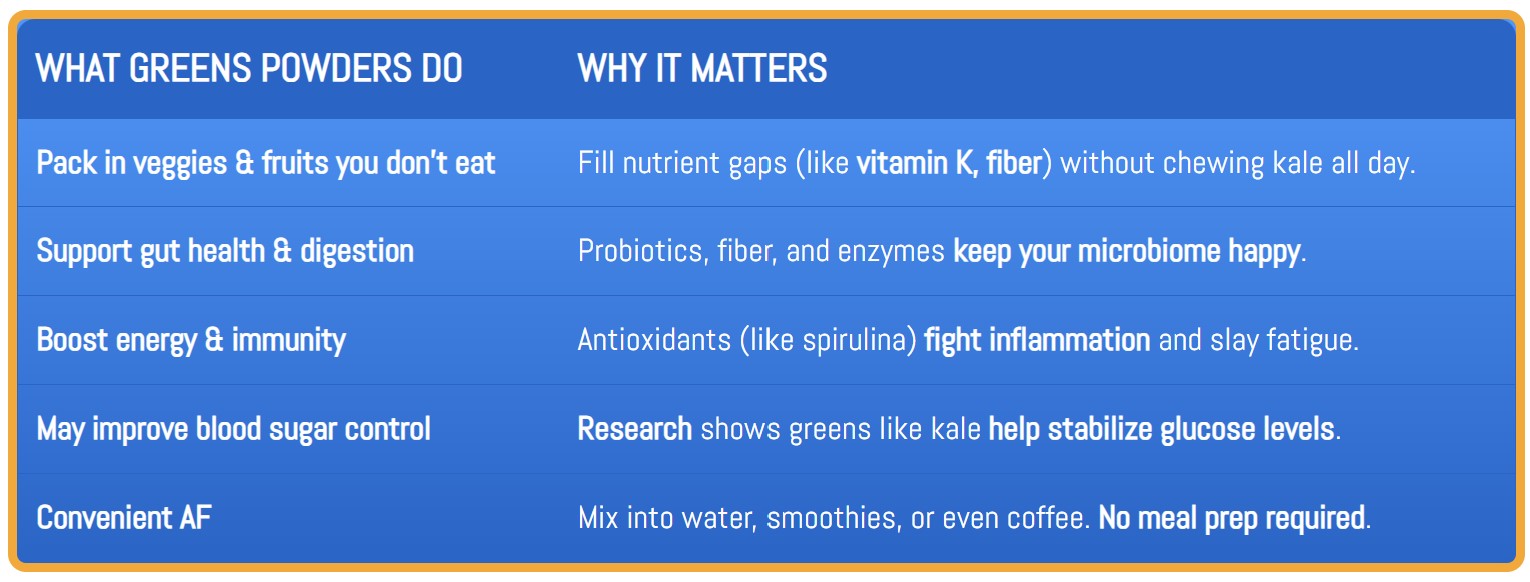So, you’re here because you want better energy, fewer nutrient gaps, and a health boost without choking down salads 24/7? Good. You’ve probably narrowed it down to organic greens powders vs. non-organic greens powders—two of the most popular ways to cram veggies into your busy life.
But which one actually deserves your cash?
Some swear organic is the only way to avoid pesticides. Others argue non-organic works just as well for half the price. Here’s the deal: Both can help you hit your daily greens quota, but with critical differences that might make one better for your health goals. Let’s cut through the marketing fluff and dig in.
Greens Powders 101: Why You Should Care

See also: Greens Powders with Probiotics vs. Without Probiotics: Which One Wins?
Now, let’s compare organic vs. non-organic greens powders and find which one YOU should choose.
Organic Greens Powders: The “Clean Label” MVP?
Organic greens powders use ingredients grown without synthetic pesticides or GMOs. They’re certified by USDA or third parties and often include superfoods like wheatgrass, spirulina, and chlorella.
Key Features:
- USDA Organic Certified – No synthetic pesticides, herbicides, or GMOs.
- Higher nutrient density – Studies suggest organic crops have more antioxidants.
- Non-GMO & often vegan – Clean label for sensitive diets.
- Third-party tested – Heavy metals, microbes? Nope.
- Price – 30-50% pricier than non-organic (you pay for purity).
Pros:
✔ Safer for long-term use – Fewer pesticide residues. ✔ Better for gut health – No harsh chemicals disrupting your microbiome. ✔ Ethical & eco-friendly – Supports sustainable farming.
Cons:
❌ Costs more – Organic certification = higher price tag. ❌ Grassy/earthy taste – Less masking with artificial sweeteners.
Non-Organic Greens Powders: The “Budget-Friendly” Contender?
Non-organic greens powders skip the certifications but still pack veggies like spinach, broccoli, and kale. They’re cheaper but may contain trace pesticides or additives.
Key Features:
- No organic certification – May use conventional farming methods.
- Often include synthetic additives – Flavors, sweeteners, or anti-caking agents.
- Cheaper per serving – Great for tight budgets.
- Wider flavor variety – Watermelon, berry, or “lightly sweetened” options.
Pros:
✔ Affordable – Half the price of organic brands. ✔ Tastes better – Added sweeteners mask the veggie bitterness. ✔ More accessible – Sold at grocery stores, Amazon, etc.
Cons:
❌ Potential pesticide residues – Linked to long-term health risks. ❌ May lack transparency – Some brands don’t disclose full ingredient lists.
Organic vs. Non-Organic Greens Powders: Side-by-Side Breakdown
| Feature | Organic Greens Powders | Non-Organic Greens Powders |
|---|---|---|
| Certification | USDA Organic, Non-GMO | None (usually) |
| Key Ingredients | Spirulina, wheatgrass, chlorella | Spinach, kale, broccoli |
| Additives | Minimal (natural flavors only) | Common (sweeteners, preservatives) |
| Taste | Earthy/grassy | Sweetened/fruity |
| Price Per Serving | $1.50-$3.00 | $0.75-$1.50 |
| Third-Party Testing | Yes (heavy metals, microbes) | Rarely |
| Best For | Long-term health, clean diets | Budget, flavor-first users |
See also: Greens Powders: Enzyme-Enhanced vs. Pure Superfoods – Which One Fits Your Gut Goals?
Which Greens Powder Should YOU Choose?
TL;DR: 🔹 Go organic if: You want zero pesticides, prioritize gut health, and don’t mind earthy flavors. Try AG1 (Athletic Greens) – NSF-certified and packed with 75+ nutrients. 🔹 Go non-organic if: You’re on a budget or need sweet, easy-to-drink flavors. Amazing Grass Green Superfood offers decent quality at half the cost.
Quick heads-up: These links? They’re to trusted retailers. If you grab a tub, I may earn a small commission—no extra cost to you. You get your greens, I get to keep researching absurdly niche supplements. Win-win. 🥬
Q&A: Unusual Questions You Didn’t Think to Ask
Q: Can greens powders replace vegetables? A: Nope. They’re a supplement, not a substitute. Whole veggies still rule for fiber and satiety.
Q: Do greens powders interact with medications?
A: Possibly. High vitamin K levels (in kale/spinach) can affect blood thinners. Always consult your doc.
Q: Are “nano greens” worth the hype?
A: Meh. Some claim better absorption, but research is limited. Stick to brands with proven ingredients.
Final Scoop
Organic greens powders win for purity and long-term health, while non-organic shine for budget and taste. Choose based on your priorities, mix daily, and don’t skip actual veggies.
Now, stop reading and start blending those greens into your morning smoothie. 🥤
